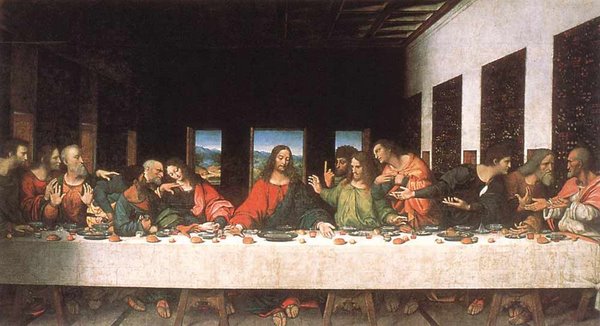
The other day at work I got into an interesting discussion about the nature of time, and how we perceive it. As of right now, I'm still not exactly sure what to think about this subject...of course, at the time I was arguing that time can move any way it damn well wants to, and that our trouble is that we can only conceive of time as moving in a straight line. Then it was time to go back to work, but it got me thinking a little more deeply into what 'time' actually is. I've come up with a few ideas that I've been mulling around in my head...which of them work, I'm not sure. Anyways, here they are, so you can judge them for yourself.
- Time as measured by the clock is merely an arbitrary way that we have decided to organize the day. This method of organization is also rather flexible. During the Middle Ages the day consisted of 12 hours of light and 12 hours of darkness, thus the precise length of each hour differed depending on the seasons. They seemed to get along fine with that sort of arrangement, which brings me to my next idea.
- The way we perceive time is dictated by our cultural associations with it, and our cultural attitude towards it. Every group of people has a slightly different perception of time and its importance. Some cultures (our Western world, for example) view time as a commodity that can be used wisely or wasted. We order our entire world around the notion of precise timing and 'proper use of time'. Other cultures don't see time in this manner, and actually take a more relaxed attitude towards it. The major difference I see here is that some cultures approach time in the manner of the factory worker, and others approach it in the manner of the farmer. Both are valid, and yet neither one works for everyone.
- The idea that time is an entity or force separate from ourselves (like gravity or energy or something) is rather hard for me to grasp. I can't get past my idea that our own personal perception colours and dictates our entire existence, and so I can't help but think that this separate entity of time exists only in some peoples' minds.
- I'm also having trouble with the idea that time moves at all. Since 5 minutes from now does not exist, and neither does 5 minutes ago, then only the present moment is real. Only the present moment actually exists in time in any real sense. This idea interests me as a historian because I have dedicated my life to the study of events that happened in a time that no longer exists. As an objection to this idea, one of my co-workers posited that since nerve impulses are not instantaneous, nor is sound or light, that everything we sense actually happened a fraction of a second ago, and that we only think of it as happening now. In response to this objection, I'd like to say that even if what we think of as the present is really a millisecond ago, for all intents and purposes it IS the present as far as we are concerned. Quibbling about how long ago the present existed really doesn't help us here.
- Time itself could possibly be one eternal point through which all things move, and during which all things live and die. Why must it be time that moves and not us?
- If time does move, the direction it moves in could be just a part of our perception. If we can't sense it going backwards, then maybe it doesn't. Yet, if it moves at all, then it must exist apart from us and our preception, and thus its true nature and direction could not accurately be determined by us and our senses. Maybe it moves in a random direction, but we only see it going forwards. Maybe (as Boethius wrote in the 6th century) time is actually moving in a big circle around a fixed point, and since we are in the circle we can only see it going forwards, while the being residing on the fixed point around which time spins (Boethius says this is where God exists) can see time's true shape. It really could be just a matter of perspective.
- Space and time must have a strange relationship since the space I occupied five minutes ago could be occupied by me again, and I would not run into myself. This idea could be used as evidence for time's motion (since the time I was walking up the stairs has passed already) or for time's immobility (since time exists eternally fixed and I can move about within it). Either one could be true, for all I know.
Ok, that's all I've got for now. It's funny, my sense of time is so bad that I can't distinguish minutes from hours, figure out what day of the week it is, or remember when anything happened. If it wasn't today then it could have been any time throughout my entire life, and I wouldn't be able to tell when it was. Hopefully someone will do some thinking on this and hit me back with some new ideas. Time for bed I guess, ciao e buonna notte.
- Time as measured by the clock is merely an arbitrary way that we have decided to organize the day. This method of organization is also rather flexible. During the Middle Ages the day consisted of 12 hours of light and 12 hours of darkness, thus the precise length of each hour differed depending on the seasons. They seemed to get along fine with that sort of arrangement, which brings me to my next idea.
- The way we perceive time is dictated by our cultural associations with it, and our cultural attitude towards it. Every group of people has a slightly different perception of time and its importance. Some cultures (our Western world, for example) view time as a commodity that can be used wisely or wasted. We order our entire world around the notion of precise timing and 'proper use of time'. Other cultures don't see time in this manner, and actually take a more relaxed attitude towards it. The major difference I see here is that some cultures approach time in the manner of the factory worker, and others approach it in the manner of the farmer. Both are valid, and yet neither one works for everyone.
- The idea that time is an entity or force separate from ourselves (like gravity or energy or something) is rather hard for me to grasp. I can't get past my idea that our own personal perception colours and dictates our entire existence, and so I can't help but think that this separate entity of time exists only in some peoples' minds.
- I'm also having trouble with the idea that time moves at all. Since 5 minutes from now does not exist, and neither does 5 minutes ago, then only the present moment is real. Only the present moment actually exists in time in any real sense. This idea interests me as a historian because I have dedicated my life to the study of events that happened in a time that no longer exists. As an objection to this idea, one of my co-workers posited that since nerve impulses are not instantaneous, nor is sound or light, that everything we sense actually happened a fraction of a second ago, and that we only think of it as happening now. In response to this objection, I'd like to say that even if what we think of as the present is really a millisecond ago, for all intents and purposes it IS the present as far as we are concerned. Quibbling about how long ago the present existed really doesn't help us here.
- Time itself could possibly be one eternal point through which all things move, and during which all things live and die. Why must it be time that moves and not us?
- If time does move, the direction it moves in could be just a part of our perception. If we can't sense it going backwards, then maybe it doesn't. Yet, if it moves at all, then it must exist apart from us and our preception, and thus its true nature and direction could not accurately be determined by us and our senses. Maybe it moves in a random direction, but we only see it going forwards. Maybe (as Boethius wrote in the 6th century) time is actually moving in a big circle around a fixed point, and since we are in the circle we can only see it going forwards, while the being residing on the fixed point around which time spins (Boethius says this is where God exists) can see time's true shape. It really could be just a matter of perspective.
- Space and time must have a strange relationship since the space I occupied five minutes ago could be occupied by me again, and I would not run into myself. This idea could be used as evidence for time's motion (since the time I was walking up the stairs has passed already) or for time's immobility (since time exists eternally fixed and I can move about within it). Either one could be true, for all I know.
Ok, that's all I've got for now. It's funny, my sense of time is so bad that I can't distinguish minutes from hours, figure out what day of the week it is, or remember when anything happened. If it wasn't today then it could have been any time throughout my entire life, and I wouldn't be able to tell when it was. Hopefully someone will do some thinking on this and hit me back with some new ideas. Time for bed I guess, ciao e buonna notte.



















No comments:
Post a Comment